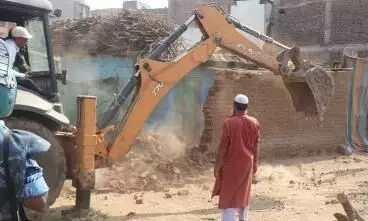
Delayed justice against Bulldozer Raj
text_fieldsThe Supreme Court has made it clear that demolishing houses, buildings and properties of people in the name of ‘bulldozer justice’ cannot be allowed, and proposed to bring in guidelines to prevent the practice. The court has underlined that razing movable and immovable properties cannot be carried out even in the event of somebody being found guilty, let alone being accused. Pointing out that guidelines have to be followed before demolishing any buildings, the court directed petitioners to furnish necessary instructions against the practice. Bulldoze Raj is a widely perpetrated violence carried out by the state and local self-administrations under the control Sangh Parivar. More than ninety percent of the victims of this illegal practice, where houses and buildings are razed to the ground if somebody is accused of any crime or allegedly possessing beef, are Muslims and the rest are from other backward communities.
This method of violence started by the Yogi Adityanath government in Uttar Pradesh was adopted by the Delhi Municipal Corporation and the governments of Madhya Pradesh, Rajasthan, Haryana, Assam, Maharashtra and Uttarakhand. Decorated bulldozers even featured in the cultural processions of these states with chief ministers beaming at being hailed as 'Bulldozer Mama' and 'Bulldozer Baba' and they bragged about the practice as the achievement of their administration. The Supreme Court intervened following the petitions, filed by Jamiat Ulema-e-Hind, against the demolition of houses and businesses of Muslims in Jahangir puri in Delhi and Nuhil in Haryana and also considering the petitions filed by the victims of the practice in Rajasthan and Madhya Pradesh. The Supreme Court has also appointed a lawyer to collect the suggestions of the petitioners and compile them. Not only was the government destroying somebody’s shelter and security of a home but the savings of their whole life. The practice began to be widely used after the protests against the citizenship struggle. The main objective is to psychologically and economically break down people from undesirable communities. It is estimated that one and a half lakh houses have been demolished by bulldozers in two years alone. This rendered more than seven and a half lakh people homeless. Saddled with children and poverty, they rough-sleep on the wayside or in makeshift tents in rain and snow. Their rehabilitation is not on the agenda. In most cases evidences are supplied after carrying out demolitions on trumped up charges and allegations of illegal construction. The atrocities were committed without even giving enough time for victims to remove the items of daily use. Clashes and stone pelting erupted in Jahangirpuri following provocation by extreme right-wing groups raising anti-Muslim slogans during the Hanuman Jayanti procession they took out. In the name of taking action against trouble makers, bulldozers ran over the houses and shops of Muslims. In many places, demolitions take place in the evenings or on holidays to prevent legal recourse. Many houses were razed down despite stay orders had been in place.
There are several instances of governments having meted out vindictive bulldozer justice. The demolition of the house of student leader Afrin Fatima, who was at the forefront of the citizenship struggle, in UP's Prayag Raj is the most notable of examples. The house owned by Afrin’s mother, which was legally built having no tax dues, was demolished blaming for the protest in the city against BJP National Spokesperson Nupur Sharma's blasphemous remarks about the Prophet. The demolition was carried out on the pretext of a complaint filed by the neighbours. Even the complainants were fake and the related documents were fabricated. A house in Rajasthan was razed down following a skirmish at school involving the owner’s son. The court pointed out demolishing a house on account of a father had an unruly son was not acceptable. Throwing the whole family out on the street over one person’s wrongdoing is not justifiable in any sense. Though belated, the significant intervention by the court is a relief to many who are facing insecurity. The judiciary's culpable silence on the issue, which is a complete violation of fundamental rights, alarmed the civil rights community. The court has now directed not to demolish without following proper procedure even if the construction is illegal. Justice delayed is justice denied. If people can sleep without the fear of having their homes razed down is a welcome justice, nonetheless it came belatedly after many lives have been squandered.























